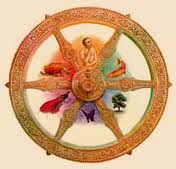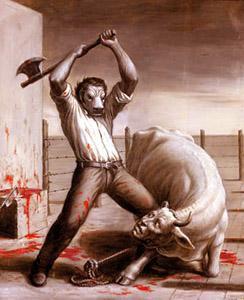Karma & Samsara
These two concepts of the Vedic worldview do a great deal to help us understand what is going on in this world, and particularly our own world. As explained earlier, Jiva is a word that refers to us as spiritual beings that live within the body. Karma pertains to the development of our material bodies and experiences, and samsara means repeated birth and death, also called reincarnation.
Here is the simple explanation of these three:
We are all eternal spiritual beings living in a material world. As a result of our observation of and interaction with the world around us we develop desires to enjoy various things and experiences. These desires are fulfilled by the agency of the material energy, i.e., the gunas, or qualities of material nature. Under the influence of the illusory energy maya, we think that we are the cause of the result of our activities. This is not correct. Man proposes, God disposes. We can desire and whether we receive the result of that desire in this lifetime depends on many factors. At the end of this life if any of those desires remain unfulfilled then we must be born again in this material world to receive the objects of our desire. The repetition of birth and death is called samsara.
Here we shall explain karma and samsara in some detail.
The Jiva
To recap, the jivas are the innumerable spiritual living beings—you, me, all of the people on this planet as well as all other living things on this planet and elsewhere in the universe. Spiritual means living. Spiritual also means person. Spiritual also means life force. There is no meaning to a non-person living being. In this material world the jiva seeks to experience the material energy in many ways. Therefore according to its desire, the jiva is awarded a particular body to fulfill that desire.
Desires = Karma
If we have a desire to fly through the air we can be given the body of a bird or an insect. If we desire to swim in the sea we can be given the body of a fish. If we desire to run swiftly we may be given the body of a horse. What we think of at the time of death determines what our next life will be. If we are thinking of women we will take the body of a woman, or if we are thinking of a man we will be given the body of a man, and so on.
Fears are also desires, therefore one must be very careful not to dwell on fears as doing so will create a karmic reaction.
Learning to Use Karma Positively
Perhaps you have seen the movie or read the book by Rhonda Byrne ‘The Secret’? Or have read Napoleon Hill’s ‘Think and Grow Rich’, or Norman Peale’s ‘The Power of Positive Thinking’, or Shakti Gawain’s ‘Creative Visualization’, or Tony Robbins’ ‘Unlimited Power’. Each of these books explains how desire creates a result. We get what we desire in life. However, we may not have our desires fulfilled in the present life, and if not we must take birth again so that the desire may be fulfilled. The authors of the above-mentioned books do not call the process they describe ‘karma’ but that is what it is called in the Sanskrit language. So the jiva creates karma by desire and receives the result of his/her desires.
Karma and Action
Karma is also created by good and bad actions—if we do good for others we will receive ‘good’ karma. If we unnecessarily cause others to suffer we will get ‘bad’ karma. If we behave in cruel, violent, judgmental, vindictive, or miserly ways, or if we kill, or cause pain to other living beings, not just humans, etc. we will receive the same treatment in our lives at some future time. If we help others, treat others with respect and consideration, do good deeds, are charitable with others, and so on we will also receive such treatment from others.
Karma as Results
Good and bad refer to reactions that we welcome or do not want respectively. Desirable things or experiences we call ‘good’ karma. Undesirable or unwanted things or experiences we think of as ‘bad’ karma.
So we create karma by thoughts and actions, and we also receive karma in terms of results that come to us without our seeking them. Being born in a wealthy or poverty-stricken family is a result of karma. Good health, intelligence, personal beauty, strength, are other attributes of karma that we receive as a result of previous pious activity. Poverty, ugliness, health problems, low I.Q., harassment, ill-treatment, are given to us as karma due to previous wrong behavior.
Group Karma
Besides individual karma we also have group karma that is shared by those in our community or nation. The current economic problems of various countries are an example of group karma, as is the relative wealth of a country, or war (or freedom from) or disease (or freedom from).
Karma and Time
Karma may act in a short period of time or over the span of hundreds or thousands of lives. Generally we do not
connect our action with the reactions we receive. However, those who learn to use the karma process can generate results quickly. A strong warning is advised with this power however, since, the process of karma must be fulfilled. It is not mentioned by any of the speakers in the secret, or in any of the other books on co-creation, but if the results of our desire are not obtained in this life we must be born again (or again, and again, and again, etc.) to get the object of our desire. It is impossible to know however what circumstances we will be born into, so this is risky business. We may be born into wealth in the next life, such as the cat or the dog that inherits his owner’s fortune. We will get the result of our desire, but perhaps not in the way we imagined!
Karma and Reincarnation
In one human life we can generate an unlimited number of desires that create a chain of karma forcing us to be bornagain and again in this world. This is called reincarnation, or samsara. Samsara literally means ‘wheel’. As a point on a wheel is sometimes at the top of the wheel, and rotating around comes to the lowest point, samsara indicates that our sojourn in this material world will sometimes give us desirable results but that will not be permanent, and in time we will find ourselves in a condition of suffering. This is referred to as shuka and dhuka, or happiness and distress respectively. Because samsara gives us a mixed result the Vedas advise us not to endeavor for material happiness that is mixed with suffering and temporary by nature. Instead we should endeavor to achieve the transcendental world that is beyond birth and death, beyond the duality of happiness and distress.
Karma is Komplex
The subject of karma is complicated, especially considering that karma is fulfilled over the course of many lifetimes. It  is impossible to trace out the history of our karma. It is compared to a huge banyan tree where one cannot find the beginning or the end (one huge banyan tree in India covers approximately two square kilometers!). It is sometimes referred to as the ‘chain of karma’ since like a chain, one action/reaction pulls us helplessly toward others—ad infinitum.
is impossible to trace out the history of our karma. It is compared to a huge banyan tree where one cannot find the beginning or the end (one huge banyan tree in India covers approximately two square kilometers!). It is sometimes referred to as the ‘chain of karma’ since like a chain, one action/reaction pulls us helplessly toward others—ad infinitum.
Dhanesvara’s coming book—Change the Karma! will explain karma in much more detail.
Dhanesvara periodically offers seminars on the subjects of “Creating Wonderful Karma” as well as “Freeing Oneself from the Reactions of Karma”. Inquire regarding the timing of the next seminar.

